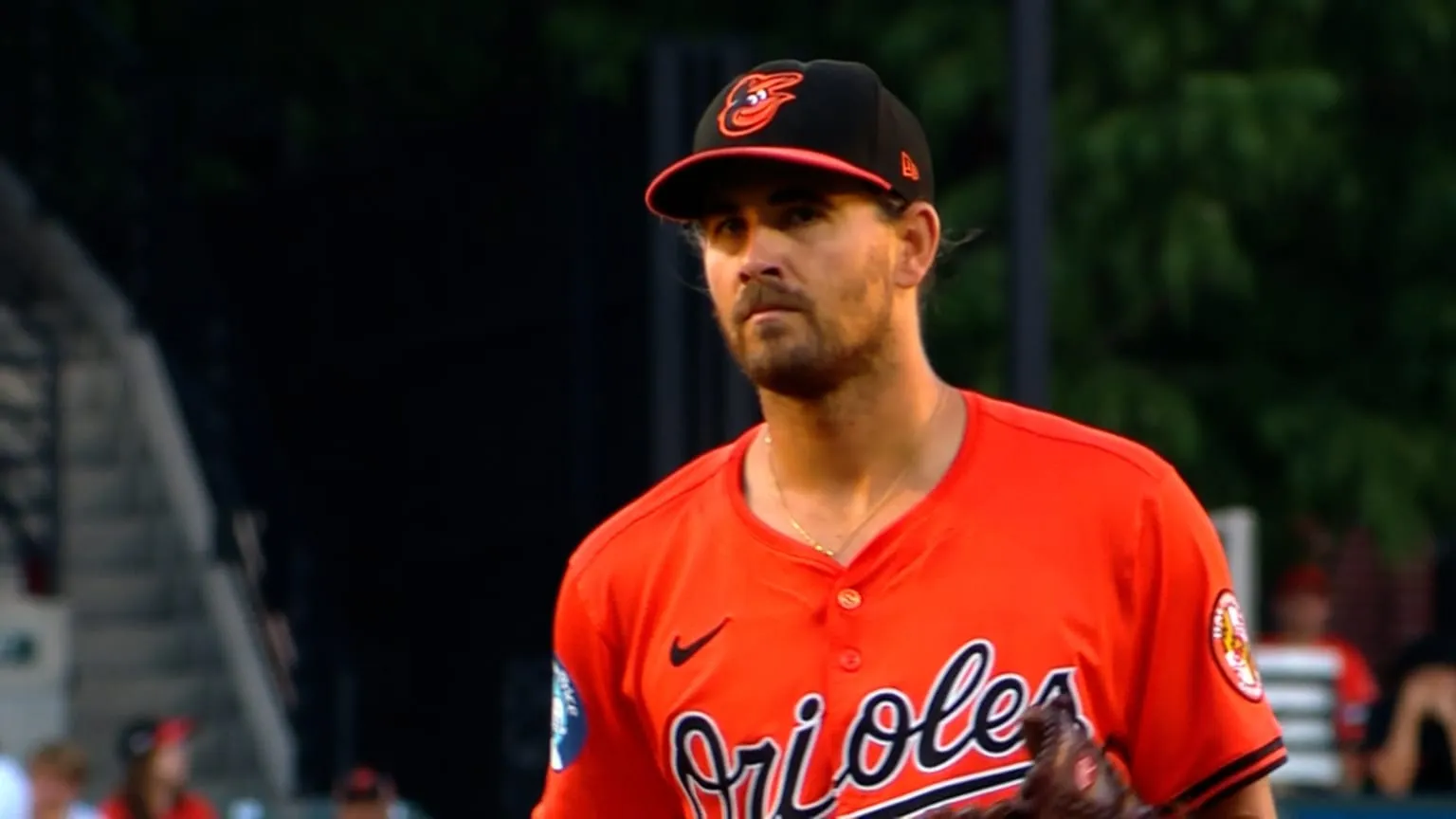

The Psychological Pressures Behind Dean Kremer’s Recent Performance Decline
Baseball, perhaps more than any other sport, is a game where the line between mental sharpness and physical execution is razor-thin. For pitchers, especially, the ability to remain calm and collected under pressure often makes the difference between dominance and disaster. Dean Kremer, a key starter for the Baltimore Orioles, has recently found himself at the center of scrutiny. His struggles on the mound have raised questions not just about mechanics or fatigue, but about the deeper psychological pressures that shape an athlete’s performance. With his recent outings marked by inconsistency, early collapses, and visible frustration, the story of Kremer is becoming a case study in how mental pressure can influence a pitcher’s trajectory in a long and grueling season.
A Snapshot of Recent Struggles
In a recent game against the Houston Astros, as reported by FantasyPros and other outlets, Kremer endured one of his toughest outings of the season. The right-hander gave up six earned runs on seven hits in just five innings. He issued one walk, struck out four, and allowed the Orioles to fall into a deep early deficit that ultimately cost them the game.

This wasn’t an isolated occurrence. In fact, four of his last six starts have seen him surrender at least three runs, underlining a troubling trend.
For the season, Kremer entered that game with a 4.19 ERA and a 1.23 WHIP across 25 starts, sporting a 9–9 win-loss record. On the surface, those numbers aren’t disastrous, but they also highlight a lack of consistency. For a team in the thick of a competitive American League East race, every start matters, and inconsistency from a mid-rotation starter can feel magnified.
The Astros Game: A Perfect Storm of Pressure
The Astros contest at Camden Yards unfolded in a way that epitomized the psychological challenges Kremer has been facing. In the very first inning, Carlos Correa, Victor Caratini, and Jesús Sánchez each launched home runs, combining for a five-run explosion that silenced the Baltimore crowd.
What made this collapse even more striking was the detail that Kremer reportedly slipped slightly on the mound early in the game, a mechanical disruption that lowered his velocity from his typical 92–93 mph range down to about 87 mph. That small loss of command and power gave the Astros an opening they exploited mercilessly.
Kremer’s frustration was visible, but to his credit, he steadied himself in the middle innings. Pitching coach Tony Mansolino even acknowledged that after the disastrous start, Kremer “settled in pretty well,” managing to regain control of his mechanics and keep Baltimore in the game. Yet the damage was already done. A seventh-inning two-run blast by Christian Walker sealed the Orioles’ fate in a narrow 9–8 loss.
Psychological Pressures: Beyond Mechanics
When a pitcher struggles repeatedly in the first inning, it often suggests more than just technical flaws. For Kremer, the psychological toll seems to be building. Each early collapse adds weight to the next start, creating a cycle of self-doubt. The pressure of knowing that one bad pitch can unravel an outing may amplify tension, leading to tighter mechanics and further mistakes.
Baseball psychologists often refer to this as performance anxiety—a state where an athlete becomes hyper-aware of outcomes instead of trusting their process. In Kremer’s case, his tendency to stumble out of the gate may be linked to overthinking in the early frames. He has shown resilience in recovering mid-game, but the inability to begin strongly reflects the kind of mental block that can only be resolved through confidence-building and routine adjustments.
The Weight of Expectations in Baltimore
The Orioles’ decision to adopt a six-man rotation for the rest of the season highlights just how crucial workload management has become. For Kremer, this could be both a blessing and a challenge. On the one hand, the extra rest may allow him to recover physically and reset mentally between starts. On the other, it underscores that Baltimore’s coaching staff is keenly aware of the fragile balance among their starters.

For a pitcher already battling inconsistency, the knowledge that the team is adjusting strategies to accommodate his struggles can add another layer of pressure.
Baltimore is no longer the rebuilding team of past seasons. With playoff ambitions burning bright, every performance carries playoff-level stakes. Kremer, as a middle-of-the-rotation arm, isn’t expected to dominate every outing like an ace, but he is expected to provide reliability. Falling short of that expectation not only affects team morale but also places Kremer under the microscope of fans, media, and even fantasy baseball managers who analyze every earned run.
Fantasy Implications and the Mental Toll
From a fantasy baseball perspective, Kremer’s recent struggles are glaring red flags. Managers who counted on him as a steady SP3 or SP4 option have had to stomach a string of rough starts, each one threatening to derail ratios in ERA and WHIP. FantasyPros framed the outing against the Astros as a particularly alarming sign, pointing out that Kremer’s inability to prevent early runs could undermine his reliability moving forward.
But what often gets overlooked in fantasy discourse is the human element. For pitchers, knowing that their performances are dissected not just by coaching staff and teammates, but also by a global fantasy audience, can heighten the sense of pressure. Athletes talk often about “tuning out the noise,” but in the age of social media and instant analysis, that’s easier said than done.
Technical Issues as a Mirror of Mental Strain
The slip on the mound against the Astros serves as both a literal and metaphorical symbol of Kremer’s current struggles. Mechanically, his velocity dip was a consequence of that moment. Psychologically, it reflected how a small disruption early in a game can snowball into a mental spiral.
Pitchers thrive on rhythm and routine, and when those are disrupted—even by something minor—it takes immense composure to recover. Kremer managed to stabilize after the first inning, but the fact that the Astros had already built a five-run cushion made it feel like an uphill battle.
This mirrors a larger theme: Kremer’s ability to handle adversity mid-game is there, but his inability to neutralize stress in the opening frame is what’s holding him back. The Orioles will need to work closely with him not only on mechanics but also on pre-game routines, mental resets, and visualization techniques that can help him begin outings with greater calm.
The Human Side: Frustration and Self-Reflection
Kremer’s frustration with himself has been acknowledged publicly by the coaching staff. Tony Mansolino’s comments revealed a pitcher who is deeply aware of his shortcomings and perhaps internalizing them more than he should. While accountability is crucial in professional sports, over-fixation on mistakes can erode confidence.
The balance between self-criticism and self-belief is delicate, and right now, Kremer appears to be leaning too heavily on the former.
Looking Ahead: What It Means for the Orioles and Kremer
For Baltimore, the stakes are clear. They need Kremer to be more than just an innings-eater; they need him to be a stabilizer. His role in the six-man rotation will give him breathing room, but whether he can convert that into consistent performances depends largely on how he manages the psychological pressure.

For Kremer himself, the path forward is equally clear but challenging. He must confront not just the mechanical flaws that surface during games but also the mental patterns that are hindering his starts. Working with sports psychologists, refining pre-game mental routines, and drawing on the support of teammates will be crucial steps.
Conclusion: Pressure as Both Enemy and Teacher
Dean Kremer’s recent struggles are not just about ERA, WHIP, or home runs allowed. They are about the invisible battle that pitchers fight every time they take the mound—the battle between confidence and doubt, control and chaos.
Kremer has shown flashes of resilience, the ability to recalibrate mid-game, and the poise of a seasoned competitor. Yet, until he learns to master the psychological pressures that haunt his opening innings, his performance will remain a rollercoaster.
For Orioles fans, for fantasy managers, and for Kremer himself, the hope is that these struggles will serve as a crucible. Pressure can break a pitcher, but it can also forge a stronger one. The next chapters of Kremer’s career will reveal which path he chooses.
Related News


















